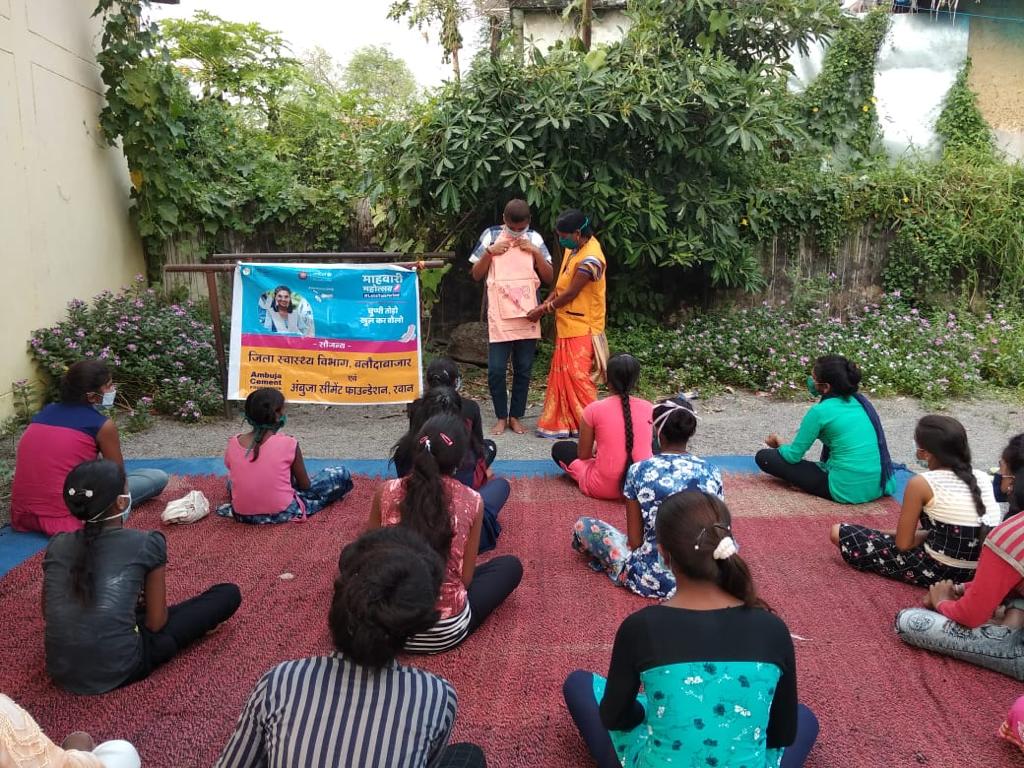In working among adolescent girls, the importance of menstrual health and hygiene cannot be emphasized less. Myths and taboos are, however, highly prevalent and dispelling them become essential to executing a successful programme in this space.
ACF’s approach is centred around a 4-pronged process that diligently works through its health workers (Sakhis) and peer educators (adolescents trained by ACF Sakhis).
1) Access to Knowledge
Sakhis and Peer educators play a vital role in spreading awareness about the human anatomy, the reproductive system, the menstrual process, and changes taking place in the pubertal phase. Tools and training materials such as Uterus Models and Cloth Aprons that can be flipped to show the different stages of the menstrual cycle are used. Maintaining confidentiality is important and with the Sakhis and Peer educators being from the same community, they grow to enjoy a relationship of trust with each adolescent girl in the community. This helps in addressing specific concerns around menstrual hygiene. Sessions are also organized with medical practitioners such as gynecologists to emphasize the need for Menstrual Hygiene Management (MHM).
2) Access to menstrual products:
Even with sufficient awareness, finding sanitary pads and napkins can be hard. Young girls sometimes must travel 20 Kms to find sanitary pads. With the stigma surrounding sanitary napkins, women also find it challenging to mention its need to the men in the household. Market unavailability especially during the pandemic has caused many more girls to use cloth napkins. The napkin is often created from used cloth material (as per an ACF study), leading to increased chances of infection. Furthermore, usage of sanitary pads versus cloth napkins is intricately linked to the income of the family. A higher family income implies higher sanitary pad usage.
While this is not an ideal solution, ACF’s Sakhis and peer educators train young adolescent girls to use new cloth material for making cloth napkins and encourage the use of reusable sanitary napkins where access is constrained. Furthermore, Sakhis go home to home creating awareness around menstrual health and hygiene and distributing sanitary pads. Module-wise training with focus on cleaning and hygiene maintenance is provided. The girls can also call up the Sakhis to request for sanitary napkins.
3) Access to MHM & WASH:
Schools in villages often lack facilities for changing and disposing sanitary napkins. This includes gender-specific toilets, clean water and soap, and clean changing places. Consequently, many girls in this age group drop out of school. ACF and its Sakhis work with schools in these remote locations to provide clean and hygienic infrastructure for managing menstrual hygiene. Renovations have been carried out in many of the schools in ACF’s locations to include water and sanitation structures and ensuring the availability of water and soaps. ACF has also created a cadre of champions in schools to support and monitor the MHM program.
4) Access to Safe Disposal of Used absorbents
With little to no awareness about safely disposing them, sanitary napkins are often disposed in sewage lines, open pits, and commodes. ACF works with Sakhis and Champions to foster behaviour change through awareness about wrapping and discarding used sanitary napkins, and the correct methods of disposal, ACF works with villages to provide disposal machines, allowing for safe and hygienic disposal of Sanitary Napkins. Moreover, specially designed collection bags or incinerators are installed in schools for disposal. ACF works with villages to provide disposal machines, allowing for safe and hygienic disposal of Sanitary Napkins. Moreover, specially designed collection bags or incinerators are installed in schools for disposal.
Comprehensively working across all the 4 pillars of the approach, ACF has reached out to more than 200 villages and over 130 schools across 18 locations for menstrual health management. An important observation in this experience has been that while adolescent girls are educated in menstrual hygiene, it is equally important to educate women where adoption of Menstrual Hygiene practices are dismally low. ACF has been working to address this comprehensively.

Recently ACF has partnered with Häfele to strengthen the reach and impact of its Menstrual Hygiene Management project across 7 locations in rural India. Together with Häfele, ACF will work to install sanitary napkin making/dispensing machines, create awareness and run educational initiatives about menstrual hygiene, and break the many myths and stigmas around it.
Looking for a CSR Implementation partner in rural healthcare? Reach out Dr. Vinayak Sonawane (Vertical Head – Health) at vinayaksonawane@ambujafoundation.com


.jpg)




0 Comment